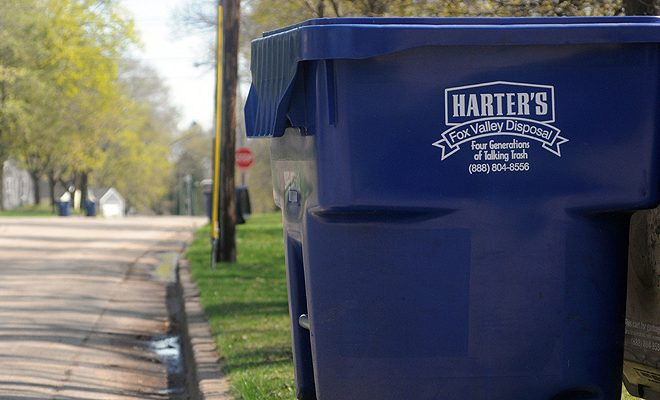
Residents will pay about $12 per month
By Bert Lehman
Residents of of Clintonville will no longer be allowed to out of the city’s garbage and recycling service.
The Clintonville City Council approved the elimination of the opt-out option at its July 11 meeting. It passed 8-2 on a voice vote. Ald. Mark Zachow and Ald. Peggy Zaemisch voted against eliminating the opt-out.
Eliminating the opt-out has long been a hot discussion topic for city leaders.
City Administrator Caz Muske said there are three concerns regarding the opt-out that prompted this round of discussion. She said with the opt-out, the city is having a difficulty receiving competitive bids for a single hauler of garbage and recycling.
She said there is also a trend of junk and sanitary code violations for properties that have opted out of the garbage and recycling service.
And the third concern is an internal challenge of managing the opt-out program.
Finance Committee Chair Brandon Braden told the council that in the past, there has always been a strong feeling that it was necessary to offer the opt-out to residents. This was due to the fact some residents take their garbage and recycling to the Clintonville Area Waste Service (CAWS), which the city helps subsidize.
“However, we are kind of an outlier,” Braden said. “There’s not really any other municipalities in the area that I’m aware of that have an opt-out program. As Caz said, it kind of puts us at a disadvantage with contract negotiations.”
Braden said the opt-out was discussed at the July 10 Finance Committee meeting, and the committee recommended the council eliminate the opt-out for residents for garbage and recycling service.
Fixed incomes
Ald. Mark Zachow said he had been contacted by some elderly citizens who are against eliminating the opt-out. He said Clintonville has a lot of older people on fixed incomes, who only have a limited amount of garbage and recycling.
“I don’t think this is a good idea,” Zachow said.
Council President Tammy Strey-Hirt said when the opt-out was originally enacted, she strongly believed that citizens should have the option to choose the opt-out.
But she said as time has gone by, and the city has found all the problems going on because of the opt-out, she changed her position.
She said she also felt that the cost t for the garbage and recycling service is not that much.
“I do understand what Mark is saying, but I feel that no matter what we do, we’re going to upset some people,” Strey-Hirt said.
Braden said the cost that residents have to pay for the city’s garbage and recycling service is around $12 per month.
Ald. Greg Rose said maybe Harter’s has a smaller garbage collection canister at a reduced rate for those citizens who don’t generate a lot of garbage and recycling. He recommended the city explore that option.
Clintonville Clerk/Treasurer Peggy Johnson told the council that Harter’s does offer different size options for collection containers but smaller canisters are not cheaper because a trip to the residence is still required.
She daid small carts were available in the past, but are not available anymore because the “arms” on the collection trucks cannot reach the small carts.
Financial impact on CAWS
Ald. Peggy Zaemisch expressed concern about the future of CAWS if the op-out is eliminated.
Muske told the council that its decision regarding the opt-out has nothing to do with CAWS.
“This does not affect them at all, they are separate from the city,” Muske said.
Strey-Hirt countered and said the decision made by the council regarding the opt-out will ultimately affect CAWS, because if the city eliminates the opt-out, and all residents use the city’s garbage and recycling service, there will be less garbage and recycling brought to CAWS. This will impact it financially.
Rose said that is something the city will have to look at and reevaluate at a later time. He added that he wouldn’t want his vote regarding the opt-out influenced by hypotheticals about the future of CAWS.
“I can totally understand that nobody wants to pay for something that they don’t need and they don’t use,” Braden said. “But part of living in a city is doing things for the common good.”
He added, “Part of being part of an incorporated city is accepting the fact that even though I may not agree with something, the perks of living in the city outweigh the disadvantages of living in the city.”
Correction: An earlier version of this story incorrectly reported that the council voted unanimously to eliminate the opt-out option.
